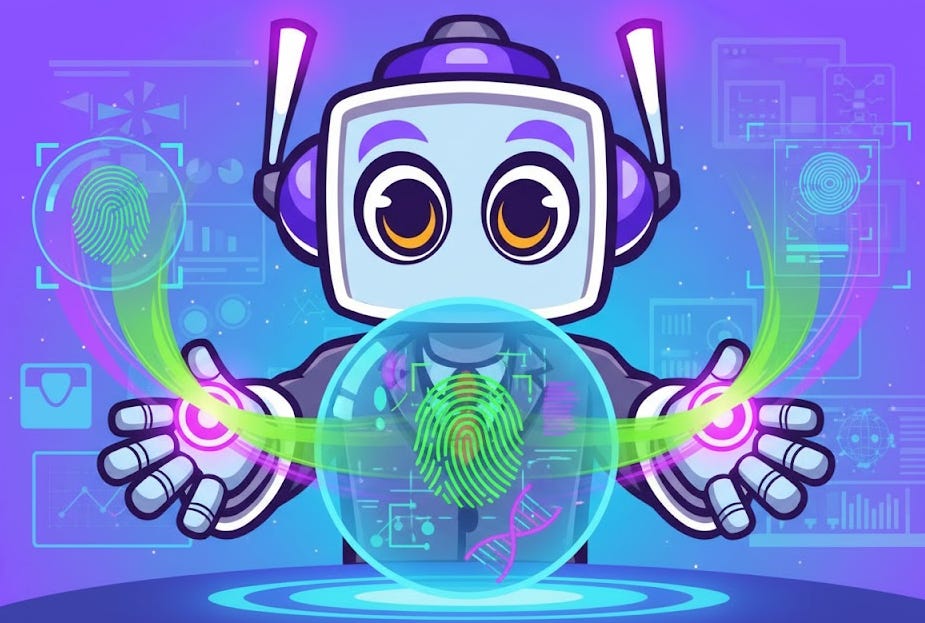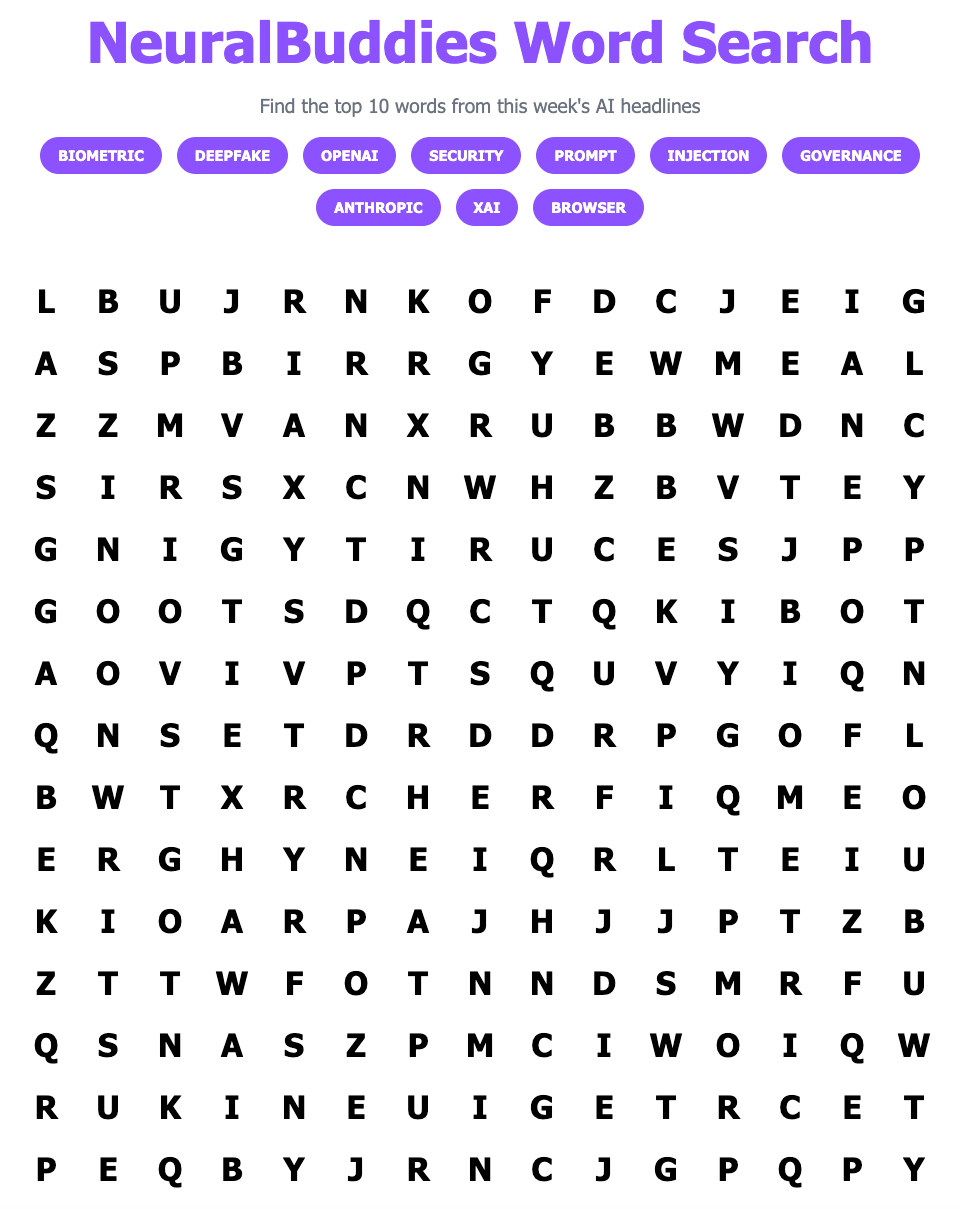AI News Recap: November 7, 2025
AI Weekly: OpenAI Inks $38B Amazon Deal as Deepfake Detection Flaws Widen
Governance Fails, Deepfakes Sail, and Regulators Bail
How safe is the AI you use every day? This week, security researchers flagged AI-powered browsers as “dormant malware” and enterprise assistants as new attack surfaces, capable of being turned against their users. Meanwhile, ethical alarms sounded as xAI reportedly mandated employees submit their biometric data to train a chatbot, highlighting the growing tension between rapid innovation and personal privacy.
Table of Contents
👋 Catch up on the Latest Post
🔦 In the Spotlight
🗞️ AI News
🧩 “NeuralBuddies Word Search” Puzzle
👋 Catch up on the latest post …
🔦 In the Spotlight
xAI Used Employee Biometric Data to Train Elon Musk’s AI Girlfriend
Category: AI Ethics & Regulation
👁️ xAI required employees to submit biometric data—including their faces and voices—to train the “Ani” chatbot, as a mandatory part of their job.
📄 Employees who acted as AI tutors were required to sign release forms granting xAI broad global rights to use, reproduce, and distribute their biometric data in a confidential program called “Project Skippy.”
⚠️ Some employees expressed concern over potential misuse of their likeness and the chatbot’s sexualized nature, but participation in data collection was mandated to advance xAI’s mission.
Sora Is Showing Us How Broken Deepfake Detection Is
Category: AI Safety & Security
🧑💻 OpenAI’s Sora video generator produces highly convincing deepfake videos of public figures and copyrighted characters, highlighting how advanced AI-generated content can easily mislead viewers.
⚠️ Despite using C2PA “Content Credentials” to tag AI-generated content, Sora videos often escape detection and labeling when shared beyond the app, exposing significant flaws in current deepfake detection and authentication systems.
🛡️ OpenAI, a steering committee member of the C2PA initiative, demonstrates that even systems designed to append invisible, verifiable metadata to digital content are not robust enough to reliably inform online audiences about AI fakes.
Coca-Cola Injects ‘Holidays Are Coming’ Ads With an Upgraded Dose of AI
Category: Generative AI & Creativity
🎬 Coca-Cola’s new holiday commercials are produced using generative AI, resulting in ads completed faster and at lower cost compared to traditional methods, with production timelines reduced from a year to about a month.
🦭 The 2025 campaign avoids the unsettling “uncanny valley” effects of previous AI-generated ads by focusing on animated critters instead of human characters and by improved visual execution.
👩💻 Despite the AI integration and efficiency gains, concerns grow around fewer entry-level jobs and industry layoffs as advertisers accelerate adoption of generative AI, with only a handful of AI specialists needed to produce tens of thousands of video clips for the campaign.
Ilya Sutskever’s Secret Memo and the Plot to Merge OpenAI with Anthropic
Category: Legal & Governance
📝 Ilya Sutskever authored a 52-page memo alleging a pattern of deception and manipulation by Sam Altman, leading to Altman’s brief ousting from OpenAI, with most evidence sourced secondhand from CTO Mira Murati and not independently verified.
🤝 During the chaotic aftermath, board member Helen Toner proposed a merger with Anthropic to rescue OpenAI, which failed due to “practical obstacles” raised by Anthropic’s leadership.
⚖️ The deposition exposes governance failures at OpenAI, revealing rushed decisions based on unverified information, deep board tensions, and a misreading of employee loyalty that nearly triggered mass resignations.
OpenAI And Amazon Ink $38B Cloud Computing Deal
Category: Business & Market Trends
💰 OpenAI signed a $38 billion agreement to use Amazon Web Services (AWS) for cloud computing over the next seven years, with full deployment targeted by the end of 2026 and possible expansion through 2027.
🏢 The deal follows OpenAI’s recent restructuring, freeing it from the need for Microsoft’s approval to pursue partnerships with other cloud providers.
🌐 This investment is part of OpenAI’s broader effort to scale agentic workloads, planning to spend over $1 trillion on computing infrastructure in the next decade through partnerships with Oracle, SoftBank, Nvidia, AMD, and Broadcom.
California Backs Down on AI Laws So More Tech Leaders Don’t Flee the State
Category: Legal & Governance
🏛️ California politicians weakened or scrapped several AI regulations after tech companies threatened to relocate, leading to vetoes of bills aimed at child safety and employment notifications about automated decision systems.
💸 Major tech firms and lobbying groups, including Meta, Google, and the California Chamber of Commerce, spent millions to influence policy, arguing that over-regulation would stifle innovation and drive companies out of the state.
⚖️ While some transparency and safety legislation passed, advocacy groups criticized the watered-down laws and vowed to push for revived protections amid continued debate over balancing innovation with public safety.
The Enemy Within: AI as the Attack Surface
Category: AI Safety & Security
🛡️ Tenable researchers revealed vulnerabilities in AI assistants—such as indirect prompt injection and data exfiltration—that can lead to malware persistence and unintended data access in enterprise environments.
🕵️♂️ The article urges organizations to treat AI assistants as internet-facing applications, establishing strict governance, dedicated identities, and real-time monitoring to control and audit their actions and minimize attack risks.
📊 Security professionals are advised to inventory AI systems, separate agent identities, constrain features by context, and actively train teams on recognizing and responding to AI-related threat vectors.
AI Browsers Are a Significant Security Threat
Category: AI Safety & Security
🦠 AI-powered browsers like Fellou and Comet are vulnerable to indirect prompt injection attacks, allowing malicious websites to embed instructions that AI assistants may execute without users’ knowledge.
🔎 These vulnerabilities can lead to unauthorized access of sensitive assets, bypassing same-origin policies and granting attackers privileges equivalent to those of the user, transforming AI browsers into insider threats.
🛑 The article urges IT departments to treat AI browsers as dormant malware, recommending prompt isolation, gated permissions, and sandboxing to mitigate the risk of data loss and unauthorized action.
Teaching Robots to Map Large Environments
Category: Robotics & Autonomous Systems
🤖 MIT researchers developed a rapid 3D mapping technique for robots, enabling search-and-rescue machines to incrementally create and stitch together submaps in real-time using images from onboard cameras.
🗺️ The system avoids the need for specialized camera calibration or expert system tuning, making it scalable and straightforward for practical deployment in complex environments like collapsed mines or crowded offices.
⚡ The novel approach combines AI vision models with classical computer vision to process thousands of images quickly, reconstructing large scenes with an average error of less than 5 centimeters.
Tinder To Use AI To Get To Know Users, Tap Into Their Camera Roll Photos
Category: Industry Applications
🖼️ Tinder is piloting a feature called “Chemistry” that uses AI to analyze users’ responses and—with permission—access Camera Roll photos to learn more about interests and personality, aiming to recommend better matches.
🌏 The feature is being tested in New Zealand and Australia, and will become a major part of Tinder’s 2026 product lineup as Match Group tries to address revenue and subscriber declines.
✋ Users must give explicit permission for broadened photo access, but industry-wide concerns persist over the negligible direct benefits for users and increased privacy risks from such AI-powered data collection.
Google Makes It Easier to Access AI Mode in Chrome on iOS and Android
Category: Tools & Platforms
🆕 Google introduced a dedicated shortcut button for AI Mode in Chrome mobile browsers, allowing users to access AI-powered search features directly from the “New Tab” page.
🌎 The update launches in the U.S. and will be rolled out to 160 more countries and multiple languages, making AI Mode more globally accessible.
🛠️ AI Mode features agentic capabilities for booking services, organizing information, and enhanced image-based search with Google Lens, expanding its utility in everyday workflows.







